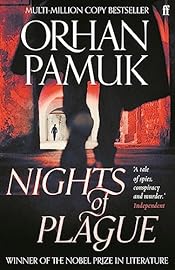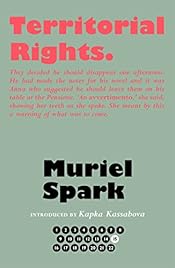Faber and Faber, 2023, p. Translated from the Turkish, Veba Geceleri, by Rekin Oklap.

This is not a typical Pamuk novel. For a start it’s not set in Istanbul which has been pretty much a major character in most of his books. Instead, it deals with the fictional Mediterranean island of Mingheria during a 1901 outbreak of bubonic plague which provided the opportunity for its revolt against Ottoman rule. Also, unlike most Pamuk novels. it’s largely told rather than shown. Part of this is that the narration is couched partly as a historical record of the revolution.
Mingheria is supposedly located somewhere northeast of Crete. Its main city, Arkaz, is dominated by a castle on a hill at one side of the harbour entrance but there isn’t adequate anchorage for large modern ships and landfall has to be made by rowing boat.
The present Ottoman Sultan, Abdul Hamid, who was installed as Sultan by a palace coup in which he replaced his brother Murad V, has sent Bonkowski Pasha to combat the outbreak. On the same ship but en route to China as envoys are Murad’s daughter (and therefore Abdul Hamid’s niece) Princess Pakize, until recently kept in seclusion in Istanbul until she married the husband Abdul Hamid procured for her, Doctor Nuri. Hence Nuri is often referred to in the text as “the Doctor and Prince Consort.”
A few days later, after Bonkowski Pasha is murdered having inadvisedly gone walkabout, Princess Pakize and Doctor Nuri are ordered back to Mingheria to investigate his death using the methods of Sherlock Holmes. (Abdul Hamid is an avid consumer of detective fiction.)
Many locals, especially devout Muslims, resist the attempts by the authorities to enforce quarantine. The ensuing confusion allows a Major Kâmil to institute a revolution which overthrows Ottoman rule. The Major (soon Commander) becomes the first leader of independent Mingheria.
Much of the supposed history here is said to be taken from the letters of Princess Pakize to her sister Princess Hatice back in Istanbul, letters which she wrote daily even when the postal service had been suspended. An emphasis on the relationships between Princess Hatice and Nuri and Major Kâmil and his wife Zeynep (nostalgic legends in Mingheria) are a corollary to this.
Several narratorial interpolations reveal that this retrospective history of the founding of the Mingherian state has been written by a descendant of Princess Hatice and Nuri. The final chapter is an envoi from that point of view.
The means by which a new state establishes itself and the myths it comes to believe are subtly portrayed (as are the parallels with the decline of the Ottoman state,) but like most revolutions the Mingherian one soon begins to eat itself. In short order Kâmil and Zeynep are dead due to plague; his successor, the Muslim sect leader and quarantine opposer Sheik Hamdullah, also succumbs to the disease; Princess Hatice is made Mingheria’s Queen but pushed into the background by Nimetullah Effendi with the felt hat; and so on. Relations with the Great Powers, who blockade the island to prevent the plague reaching Europe, are critical to Mingheria’s future.
Pamuk is consummate and always in control but to my mind in Nights of Plague, though there is plenty of story (you could almost say too much) some of the rewards of reading fiction are missing. There is not much here to allow the exploration of character, most of whom are sketched rather than fleshed out, or indeed character development. It is certainly unusually structured for a novel. It is however an exemplary way of writing a critique of Turkish society without going at it head-on; an approach arguably necessary for a writer from a state sensitive to any hint of criticism.
Since he started writing this book in 2016 it is also unlikely to be a reflection on the Covid pandemic, though of course that does now hang over any reading.
Mention of football (albeit only in one sentence) and of the author Orhan Pamuk as being an acquaintance of the narrator – both are museum enthusiasts – are typical Pamuk touches.
It is of course essential reading for Pamuk completists but has enough to recommend it to the merely curious.
Pedant’s corner:- Translated into USian. “the hoi polloi” (hoi means ‘the’; it’s just ‘hoi polloi’, then, no ‘the’,) enormity (employed here to mean ‘hugeness’. It doesn’t; it means ‘monstrousness’,) “off of” (no ‘of’, just ‘off’,) “a particularly tough contingent who was known to mistrust” (a particularly tough contingent which was known to mistrust,) “that he was going be punished” (going to be punished,) a chapter beginning with a sentence of dialogue with no starting quotation mark (I know this is a publisher’s convention but it annoys me,) “the Halifiye sect were being goaded” (the Halifiye sect was being goaded,) “landscapes …. that Sami Pasha had hanged on the walls” (I doubt this meant they were executed: ‘had hung on the walls’,) “arrival to the island” (arrival on the island,) Cretian (Cretan,) “moored to the docks” (moored at the docks,) “was I was finally” (the second ‘was’ is superfluous.)























